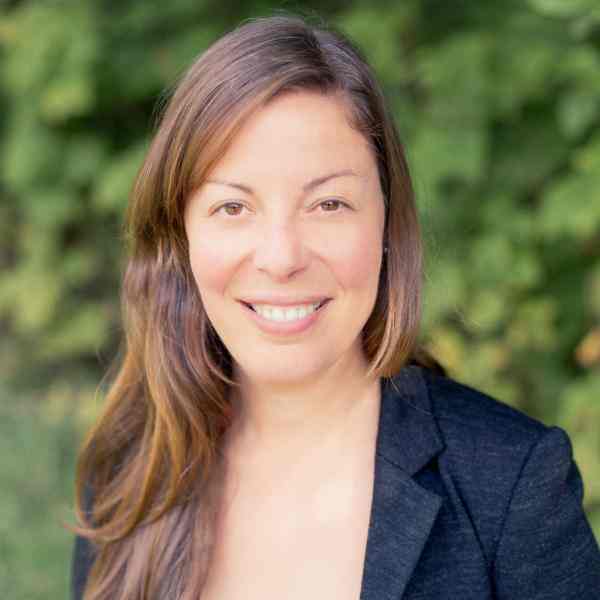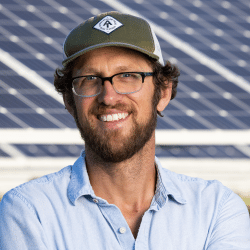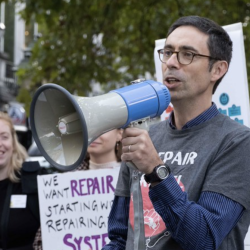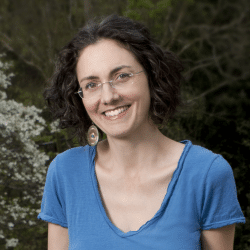Introduction
Sara Dent is working to reverse farm loss in Canada through Young Agrarians by providing educational support to enable an economically sustainable and inclusive pathway for new and young people to farm ecologically. By equipping new and potential young farmers with community, knowledge, and tools to succeed, Sara is ensuring that Canadians continue to grow and consume local foods that regenerate soils and communities.
The New Idea
With less than 9% (22,635) of new farm operators aged 35 and under in Canada (Statistics Canada), Sara has developed a participatory, community-based approach that tackles both the individual barriers of entry and the systemic issues underlying the continuing decline in the numbers of farmers. Young farmers are operating in market failure conditions whereby the costs associated with farming (land and production) are higher than the farm’s earning potential.
Young Agrarians (YA) works to build a new generation of farmers who contribute to stable and resilient food systems, grow their local economies, provide jobs, and adapt and mitigate the effects of climate change by creating an ecologically sustainable pathway for success. Sara employs three tactics to attract and retain young people: leveraging social capital through new farmers’ networks, providing programs that are free or by contribution, and re-designing policy and practice with governments to address the underlying barriers to entry.
Sara’s holistic and youth-focused approach aims to break down social isolation and deepen relationships and trust between new and young people, established farmers and landholders. By doing so, YA is capitalizing on intergenerational knowledge and the proliferation of ecological farming practices. Sara builds and leverages social capital through community engagement strategies like on-farm events and mixers, farmer-to-farmer support networks, and deep relationship building. Through community-based events, YA bridges gaps, and builds community through facilitated social networking. These relationships provide the foundation for knowledge sharing and program development.
YA programs provide access to land, business mentorship and coaching, on-farm training in regenerative agriculture, educational events, and e-learning.
The British Columbia Land Matching Program (BCLMP), delivered by YA, provides free access to land matchers who work with new and young farmers to access land, ensure they are ready to start businesses, and navigate legal agreements. The land matching service is a personalized technical assistance support and facilitation pathway that aims to build mutually beneficial relationships between farmers and landholders for land sharing. YA features positive partnerships and relationships to the wider community to promote best practices. In addition to the land matching program, YA has developed land access guides, lease and license templates, and a non-family farm transition toolkit, that outlines the processes for land sharing and succession providing free, downloadable knowledge tools.
To address the systemic barriers faced by young farmers, Sara encourages and engages key stakeholders like governments and lenders to shift practices and policies. YA’s New Farmer Policy Framework works to address the three key barriers faced by new and young farmers: access to land, capital and knowledge. It recommends five actions: on-farm training, farmer-to-farmer mentorship, land access and transition, infrastructure grants, and working capital loans. Sara works to encourage stakeholders to redesign and evaluate their services to reduce the barriers faced by new and young farmers. Sara’s approach works to grow an alternative model that places young and potential farmers as the solution to addressing the declining number of farmers.
The YA approach and model works to build a long-term sustainable entry point for young and potential farmers through deep relationship building and peer learning, free land access resources, and policy work to ensure that new people can enter the agricultural sector. With strong partnerships with policymakers and lenders, Sara is setting a new standard of engagement with young farmers.
To date, YA has completed almost 300 land matches on 11,400+ acres in B.C. and engaged over 6,500 farmers and landholders. Their business mentorship programs span Western Canada, while their policy work has influenced and engaged governments across the country. Their U-MAP listing platform has 1,785 land and farmer listings on over 35,000 acres of land. To date, they have engaged 20,000 people in Canada through educational and networking events. Young Agrarians works to put in place the tools, structure, and community to ensure that there will be a new generation of farmers who are skilled and able to re-energize and revitalize farming and ecological food systems.
The Problem
The farming population in Canada makes up only 1.3% of the country’s population as per the 2021 Census of Agriculture (StatsCanada). The farming industry is experiencing both an aging population and a decline in new farmers. In Canada, the average age of a farmer is 56 and has continued to increase across the provinces. Without new and young farmers, Canada will continue to see a decline in the number of small to medium-sized farms. According to Statistics Canada, “given industry consolidation and aging of farm operators, the number of farms dropped by 1.9% from 2016 (193,492 farms) to 2021 (189,874 farms)”. More and more farms are consolidating to become larger businesses with commercialization and profit management as a priority. For many established farms, the only way to gain a profit in the sector is to become larger and more commercialized. However, smaller, and medium-sized farms are more likely to grow food ecologically, sell to local supply chains, and build resilient food systems. Stronger food systems not only address environmental challenges but provide a diversity of food that can address other societal challenges like poverty and nutrition.
For new people interested in growing food and farming, many have to start small. However, young people who are farm-curious are often steered away from agribusiness due to financial and economic barriers such as affordability of land, lack of access to financing, low profitability in the sector, lack of infrastructure and security in markets and distribution channels, and so on. Since the 2016 Statistics Canada census, the market value of land and farm buildings rose by 22.7% in 2021 alone. The price of land continues to increase: Farm Credit Canada (FCC) reported that land prices increased by 8.3% between 2020 and 2021. The price of land is dependent on market conditions and is not regulated by governments in Canada. Young people have difficulty accessing operating loans from lenders like Farm Credit Canada (FCC) due to legislative barriers, therefore requiring new farmers, who are often leasing land, to be significantly under-capitalized. With the cost of land at an all-time high, new farmers must have considerable wealth to be able to purchase land. In addition, these high financial barriers mean that the farming sector is not enabling cultural and gender diversity; Indigenous, Black, and women farmers who already face many barriers to entry are further marginalized in accessing funding for purchasing farmland.
“The New Farm Start-Up Guide” published by the province of British Columbia reported that over 70% of small farmers’ businesses close or change within five years. Farmers need to make at least $10,000 in annual sales for farming to contribute to household income. It is normative in agriculture for farms to require off-farm income. With almost 50% of those aged 35 and younger leasing land, the prospect of equity building can be low. Almost all young farmers report that off-farm income is their main income source. With so many barriers to accessing capital and economic stability, many farmers tend to exit the agribusiness sector for other careers. Therefore, the replacement rate is very low in an aging sector.
According to the Royal Bank of Canada, only 1 in 12 farms has succession plans. This results in a major loss of knowledge and land accessibility for new farmers. This is due to the limited opportunities for relationship building between farming communities, landholders, and non-farming communities. According to the Report of the Standing Committee on Agriculture and Agri-Food by the Canadian House of Commons, many farmers faced mental and financial health challenges due to uncertainty around transferring businesses and or legacies. Without strong succession plans, not only is there a disruption in an operational farming business, but this can lead to farmland going unused or being incorporated into larger farms.
The Strategy
Young Agrarians has established programs and policies that support new generations of farmers to have the skills, financial access, and networks to succeed. Sara emphasizes the importance of reducing social isolation and developing strong programs that capitalize on knowledge held in the farming community. Each program and tool are developed within the local community, as regulations and processes differ from province to province. YA’s approach is centred on what Sara calls a ‘Grow-A-Farmer’ strategy, ensuring that program deliverables tackle both individual barriers and underlying systemic issues. At the heart of this work is community building.
YA hosts community events year-round to build farmer-to-farmer relationships. These events build trust and bonds in what are often isolated rural communities. Using participatory practices from the global south and youth empowerment programs, Sara brings farmers together online and in-person to network and deepen relationships. YA invites new and young farmers to host webinars and in person gatherings to share their stories and experiences. YA works to ensure that convening spaces are welcoming for women, who have traditionally been overlooked for leadership roles in the sector. Over 50% of YA participants are women. In addition, Sara is co-creating spaces for marginalized communities to engage and connect. A training partnership is in place with kinSHIFT, an indigenous-led organization, to enable non-Indigenous farmers to learn and deepen their relationships with the Indigenous communities whose lands they live and farm on. The goal is to build cultural competencies in the farming community, to grow relationships with First Nations with the hope for more land-based collaboration that supports Indigenous Food Sovereignty. Young Agrarians programs work to ensure that diversity is central, and that women, BIPOC, LGBTQ2S+ are able to access resources and a supportive community.
In addition, these provide the space and opportunity for young farmers looking to lease land or older farmers looking to develop succession plans. Sara sets the right conditions for both communities to meet, engage and discuss a mutually beneficial pathway for land access and succession. This sustains the number of smaller farms and creates more transition options for farmers and former farming families. In addition, Sara not only addresses social isolation through networking and community events but by also engaging farmers and landowners to provide housing where possible on farmland. All of the community programming does not always lead to farming the land, but it provides young people interested in agribusiness an opportunity to develop skills, agri-knowledge, and community connections. This organizational work in the long-term to support new generations to farm, build local supply chains and promote ecological farming practices; all of which contribute to stronger and more resilient food systems.
Sara’s second strategy is providing technical tools and services for new and potential farmers to access knowledge, experience, and land. Young Agrarians provided opportunities for engagement, online and in person, and has run over 416 education activities including e-learning courses and business bootcamps since 2012. The business bootcamp session is an 11-week program that provides participants with the tools required to build a business plan. These workshops also include time for relationship building and collaboration through peer learning sessions. Young Agrarians also delivers an on-farm apprenticeships program in regenerative agriculture, with a focus on hands-on skills training. The program enables aspiring farmers interested in full-time farm work and skills training to be mentored by seasoned farmers. To date, YA has engaged with 71 host farms and 88 apprenticeships across the Prairies. YA’s Business Mentorship Network has seen over 64% increase in revenue and 72% more volume of food produced working with 126 mentees supported by 50 farmer mentors across Western Canada.
In 2016, Sara adapted Quebec’s land matching program (L’ARTERRE) to B.C., which was provincialized in 2018 as the British Columbia Land Matching Program (BCLMP) through a funding partnership with the B.C. Ministry of Agriculture and Food, to increase land access for new entrants. Through Sara’s deep policy and advocacy work, the BCLMP is integrated into the provincial budget. Through this initiative, new, young, and potential farmers can meet and engage landowners through a local land matcher to discuss potential opportunities for their farming business. Landlords can post their land opportunities on the U-Map, a digital inventory of resources including available land to lease. Land matchers will work with both parties to develop land use agreements that are legally reviewed for free. The land matchers are deeply connected in the farming community, either as farmers themselves or farming enthusiasts. The land matching program deepens and strengthens the relationship between landlords and new farmers resulting in positive long-term relationships. Farmers can discuss their business models and plans with a land matcher and gain business mentorship support to enhance or further develop their business plans, including providing referrals to other agencies and business development support. By providing this service for free, Sara saves new and young farmers hundreds of dollars in legal and business fees. This is essential as it incentivizes young people to continue the process rather than exit due to the land access barrier. Their tools and guides are free and can be easily duplicated for government, local and financial stakeholders.
Young Agrarians has completed almost 300 land matches on 11,400+ acres since 2016. Sara is re-imaging land leasing as a form of philanthropy to enable landholders to support local food systems and create land sharing practices best supported by a wider community, benefiting the public at large. For many participating landholders, their main focus is for their land to be used for growing food. This work also incentivizes richer landholders to rethink their role in shaping Canada’s farming industry. This realignment is done through modelling positive communication between new, young, and potential farmers and landholders. The neutral and personalized support by the land matcher gives both the farmer and landholder insight into each other’s business needs, barriers, and challenges. Both parties learn something from the experience regardless of the outcome.
A third strategy, Sara also aims to win policy reform at the federal and provincial government levels and mobilize more significant funding frameworks for new, young, and potential farmers. Sara works directly with the B.C. Ministry of Agriculture and Food to help develop their new entrant farming strategies, including the use of YA templates and tools as best practices. Named by the British Columbia provincial government as a key resource for young farmers to gain information about running a sustainable agribusiness, she has cultivated a strong presence within the province by working directly with the government and through developing partnerships and coalitions with local non-for-profits, funders and governments throughout B.C.’s bioregions.
Young Agrarians Federal Policy Framework designed by Sara is the organization’s proposal to reverse the decline in the number of farmers. Broken down into three parts, Access to Knowledge, Access to Capital and Access to Land, the proposal is pushing for change in the next Sustainable Canadian Agricultural Policy for 2023-2028. These three pillars are addressed in YA’s service offerings provided to participants but also aim at the federal level to increase access to capital for the next generation of farmers, including infrastructure grants, and lending opportunities not based on land as collateral.
Young Agrarians policy work also engages financial players and lenders across the country to tackle barriers to financing. By building strong relationships with lenders, they have become a referral organization, one that equips farmers with the basic requirements to access capital. Participants can then work with YA to either build stronger business plans or find other means to start or continue their farming business. They have strong partnerships with national non-profits like Futurprenuer, the only national non-profit which supports young people with financing to provide loans to farmers working in agri-businesses. Sara is advocating for an update to the Canadian Agricultural Loan Act (CALA), so that Farm Credit Canada (FCC), the biggest agricultural lender in the country, can enable working capital loans (rather than just land acquisition) to young and new farmers. According to StatsCanada, 50% of young farm operators lease farmland. Sara and her team have built strong relationships with lenders like Vancity Credit Union, British Columbia Real Estate Foundation, Alberta Real Estate Foundation, and the Agriculture Financial Services Corporation. Working with local lenders, particularly those working in the land-based sector, Sara shares the lived experiences and barriers of young people to convince these groups to shift and redesign better lending practices.
Sara aims to set the right social, economic, and policy conditions for young farmers to succeed. Having identified the gaps in available programming, Sara has assembled and developed an approach that places new and young people at the centre. YA’s influence spans across the country and beyond. Sara continues to scale, with new funding partnerships in the Prairies Provinces. Sara aims to reach a million people a year through activities. Her long-term goal is to see 10,000 new farms in the next 20 years. In addition, she hopes to continue leveraging the work of Young Agrarians at the federal level for more long-term sustainable funding pathways.
The Person
Sara has always felt the need to positively impact the world having been raised in a multicultural family that includes Eastern European Jewish, Trinidadian, African-American, and Dakelth/Carrier peoples. Having lived in three of the most populated cities (Toronto, Vancouver, and Montreal) in Canada by the age of 19, she had already been exposed to a diversity of needs and communities. Her Toronto-based grandparents were at the forefront of advocacy fighting against fascism in the 1930’s and 1940’s, and for initiatives like universal healthcare, labour rights, and the environment. Her dad, a family doctor, integrated social values into his medical practice. This need to be a positive member of society led her to Concordia University, where she was exposed to Quebec. There she worked with student initiatives to promote social justice. Her experience leading a student union orientation festival during protests and violence changed her outlook toward community programming and leadership. This event was the first time Sara would bring together an intersectional community at a larger scale, which is now one of her greatest skill sets.
With this new insight into and knowledge of the world, Sara attended the World Social Forum in Porto Alegre, Brazil in 2003, where she heard firsthand from Perry Schmeiser, a Canadian farmer who was suing the large agro-chemical company Monsanto for GMO contamination of his fields. This was her first time meeting a farmer and she was shocked that she had to travel to Brazil to learn about Percy’s trials and tribulations. Using everything she had learned in her childhood and university years about the importance of community and networks, Sara began exploring farming and food systems.
Sara started documenting farmers and food systems through an ongoing photography series and at 26 she began farming. At this time, Sara worked with an organization called Power of Hope, which brings together youth with adult facilitators to unleash leadership through creativity using a participatory community engagement model. Power of Hope brought Sara to Linnaea Farm and in 2008 she took the Linnaea Ecological Garden Programme, which immersed students in day-to-day farming and class learning on ecological farm practices from around the world. Sara continued to farm for five years, in B.C. and Mexico, and travelled across Canada photographing, and meeting farmers. Her personal experience as a young farmer, learning on farms, and documenting food systems, led her to dream of a more resilient, connected and ecological future. For Sara, farming is applied activism, where one can use their hands to create a direct, interconnected relationship with the world, that provides essential sustenance and has the potential to collectively heal our relationships with the land- and repair the immense damage of industrialized land use practices.
While working for Power of Hope, Sara attended the Social Venture Institute (SVI) in 2008. Here she learned about social entrepreneurship and began connecting into a community of leadership for change. Merging her own farming experiences and community engagement experience from Power of Hope, Sara was able to pitch Young Agrarians to the SVI community in 2011. She was successful and received the first two donations to start Young Agrarians at SVI. Sara began developing programs that incorporated all the things she had learned through her community development work, and as a farmer to build an organization that provided the tools for young farmers to begin. She began by addressing social isolation through community-based facilitation driven by farmers volunteering to host, and then started developing programs to fill gaps for new people wanting to farm and developing multi-stakeholder partnerships to support the work to grow.
Sara’s commitment to social change at all levels comes from her family’s commitment to creating a better world for all. Sara always strives to put her community, staff, and young farmers at the heart of all that she does.




